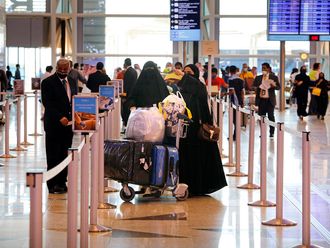Washington: As Congress prepares for a vote to override the expected veto of legislation to let families of September 11 victims sue Saudi Arabia, some lawmakers are having doubts about the measure — despite the fact that it passed both chambers without any objections.
Many are echoing President Barack Obama’s concerns that the bill might jeopardise American interests by giving foreign governments an excuse to drag US officials into court over any number of controversial foreign engagements, such as the Iraq war.
“There is a legitimate concern the administration has,” said House Intelligence Committee ranking member Adam Schiff, Democrat-California, adding he would like to see “further” modifications to the bill, such as tailoring it to address only the September 11 attacks. “If there’s a way to improve the bill and reduce the collateral impacts that were not intended, then we ought to do it.”
The bill would allow courts to waive claims to foreign sovereign immunity in cases involving terrorist acts on US soil. September 11 victims’ groups say it is vital to their efforts to sue Saudi Arabia over its alleged ties to the terrorists who carried out the attacks. The Saudi government denies there were any such ties and is lobbying strongly against the bill.
The House and the Senate both passed the legislation by unanimous consent. That led supporters of the measure to assume the votes needed to override a promised veto, two-thirds of each chamber, are secure.
But no one has actually counted the votes and the public hand wringing by some lawmakers, particularly Democrats, casts doubt on whether overriding the veto is a sure thing.
“I hope the votes will be there,” said Senator Charles Schumer, Democrat-New York, one of the bill’s co-authors, in a statement. “The idea that this bill would throw a diplomatic wrench into the works just isn’t true. In my view, the fear of upsetting the Saudis isn’t a good enough reason to be against this bill.”
But not all members of Congress agree that the Saudis’ concerns can be dismissed, even if the September 11 victims’ families’ case is sympathetic.
“From what I can tell, I don’t think the government of Saudi Arabia was involved,” said Senator Lindsey Graham, Republican-South Carolina. Earlier this year, Congress released previously classified pages of an inquiry into the September 11 attacks concerning Saudi Arabia that shed no new light on the allegations.
Graham said Saudi officials see the legislation “as a hostile act” and a potential “breaking point” in already-tense relations with the United States.
He also wants lawmakers and administration officials to return to the negotiating table to try “to find a way to move forward with the legal process that doesn’t destroy the relationship”. Ideally, he said, the president could issue some sort of executive waiver to limit the bill’s impact.
“That’s worth investing some time in. If we fail, we fail,” Graham said. “But I think it’s worth a try.”
But some lawmakers said making changes at this point is unrealistic.
“You’re pitting 9/11 victims against our own national security down the road, that’s what it is, really,” said Senate Foreign Relations Committee Chairman Bob Corker, Republican-Tennessee. “I’m not hopeful that we’re going to be in any different place, whenever we vote.”
The legislation was modified earlier this year before it passed both chambers to address some of the concerns raised by the White House. Bill supporters say any more fine-tuning is unnecessary and argue that if Saudi Arabia did nothing wrong, it has nothing to worry about.
At this point, lawmakers are also racing against the clock.
Senate Majority Whip John Cornyn, Republican-Texas, who helped Schumer write the bill, said on Thursday that “we’re going to have a veto override, I think, before we leave” for the run-up to Election Day.
But the Senate was hoping to depart Washington before next Friday, which is the White House’s deadline to veto the legislation before it automatically becomes law.
The longer the White House takes to veto the bill, the more likely it is that the override issue remains unresolved until the post-election “lame-duck” session. This would give critics time to push for further changes to the legislation and more time to sway members who have not made up their minds.
“I have not decided,” said Senator Angus King, Independent-Maine. “I haven’t satisfied myself finally of the effect, and I think the veto brings it into sharp relief.”
Judiciary Committee ranking member Patrick Leahy, Democrat-Vermont, said he has decided how he will vote, but declined to say whether he supports overriding the veto.
Senate Foreign Relations Committee ranking member Ben Cardin, Democrat-Maryland, said he intended to consider the president’s veto message before making a final determination.
“Is there a venue for effective relief for those who were victimised by the terrorist attacks, and secondly what are the consequences?” Cardin said. “I hope the president’s message will deal with both of those issues.”









